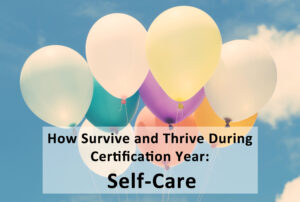So, I have recently transitioned into somewhat of a supervisor role, which is a new experience. In the residency program I am in, residents don’t work together a lot, and generally not in a junior-senior way. More like two or more people on the same rotation, but rarely providing care to the same patient. It’s also been hit-or-miss whether medical students are on rotation with me, and sometimes they work directly with a staff physician rather than with the resident.
Now I find myself with not one, but a few junior residents!
And…I am struggling.
In the past few years, I have learned to do my work well. There will always be room to improve and grow – this is probably true for any physician (really, for any line of work) – and at the same time, I feel comfortable that I am on track for what I should know, how I should be able to provide care to patients, communicate effectively with patients and families, and communicate effectively with other healthcare providers (e.g. other physicians, supervising physician, allied health providers).
But.
This supervising role?
*deep breath*
Imposter Syndrome
Every overachieving, perfectionistic type has had a brush with Imposter Syndrome. It’s like when a cat does the slink thing against your leg after you’ve ignored said cat for a while, and it wants to say, “I’m still here.” (Except cats are way cuter than Imposter Syndrome). If this is a new term for you, here’s what it means.
Imposter Syndrome:
“[…] a psychological pattern in which an individual doubts their accomplishments and has a persistent internalized fear of being exposed as a “fraud”. Despite external evidence of their competence, those experiencing this phenomenon remain convinced that they are frauds, and do not deserve all they have achieved. Individuals with impostorism incorrectly attribute their success to luck, or as a result of deceiving others into thinking they are more intelligent than they perceive themselves to be.” – Wikipedia
I can think back to several points when Imposter Syndrome came up.
- First year of undergrad: “There are so many smart people! My true place at the bottom of the heap has finally been exposed.”
- First year of medical school: “Everyone is so talented! And smart! I don’t belong here at all…”
- First day of residency: “Whatamidoingwhatamidoingwhatamidoingomgomgomgomg – yes, hi, yes, I’m Dr. ____.”
- First day of every new rotation: “What is happening? What am I doing? Where am I supposed to be? I’m going to fail this rotation. They’re going to fail me out of medical school/residency.”
- First 100 times of giving a presentation: “I have no place being anywhere near the podium. No one should listen. I should plead sick. What am I doing here?”
- First official date: “The does-he-doesn’t-he-like-me phase is over. Now he for sure knows he doesn’t want to be with me. I should just go. I’m definitely not the right type of gal for him.”
Looking back, newness seems to be a key factor for when Imposter Syndrome rears its unwanted head for me. What about for you?
Returning to this new experience of a supervisor role…Imposter Syndrome once again floats through the front of my thoughts.
“Hah. You, supervising other residents? These people already know as much as you do, if not more. What do you think you’re going to teach them?”
“Leadership, huh. You don’t even know how to lead. And now everyone will know. You fraud.”
“You’re…okay…at doing the clinical work. Just stick to what you sorta know and don’t go mucking other things up.”
Over-Compensating
So, what is the result?
Well, as a resident (and previous medical student) who has been on other teams with senior residents, I can tell as a junior team member which seniors are more confident and which are less confident. The same thing applies for staff physicians, now that I think about it.
The more confident ones generally let you do more and trust you to do more. You know you can turn to them when you need them, and otherwise, you learn to figure out your way of doing things and gain your own confidence.
The less confident ones hover. The micromanaging just kills the spirit.
And sometimes, depending on a mix of factors, the less confident ones can hover +/- criticize +/- nitpick at the small things +/- demonstrate significant irritability (especially at questions).
(And this obviously isn’t an issue just in medicine – it’s something we face in every work environment where there is middle management and leadership. Thus, almost everywhere.)
So…I think I may have micromanaged the first time I acted as junior attending physician. *facepalm* I would like to think it was only a bit of micromanaging, but I’m not sure I would know the true degree without feedback from the junior resident. (And this junior is very conscientious – I’m not sure I would get true, fulsome, unfiltered feedback. However, I do plan to ask anyways.)
The second time, I couldn’t be present as I was engaged with another clinical duty, and things went well even though I was not there. (No kidding). But still, it was helpful to have the experience.
Hopefully things get better moving forward.
Connections to Parenting?
This post was actually inspired by reading this one from Freedom101 about letting your kids fail. Now, I’m not actually a parent, but I enjoy reading parenting-related articles because I “think ahead” (which is on a continuum with worrying pre-emptively, lol). I will summarize it below, but I highly recommend reading the original article!
In this post, Phia from Freedom101 talks about the benefits of allowing one’s children to figure things out on their own rather than leaping to their aid (sometimes/oftentimes even unasked). “If we do everything for them, it’s not their success or accomplishment. It’s ours, and we are stealing it away from them.”
That is an awesome line.
And, highly applicable to leading in any aspect. Including leading in medicine.
When a medical team leader does everything (a.k.a. micromanages), he/she may be stealing the sense of ownership of and responsibility for a patient’s care from the junior learner (e.g. resident/junior resident or medical student).
The sense of ownership of a patient’s care is one of the many intangible yet precious aspects of being a healthcare provider. There is – at least, for me, as a learner – a deepening of the connection I feel to this person in my care, the family system they come from, and the healthcare system they are navigating. There is more emotional and energetic investment on my part. The impressions are deeper, and the learning is also etched more deeply. There is a greater sense of responsibility for their well-being, of putting in that 110% to ensure everything goes as well as possible.
I want that for all the learners who will be working with me.
What I’m Going to Do
There is a gradual shift in the culture of medicine toward asking for feedback. However, the days in which nothing less than perfection being expected at all times is still alive and kicking too. The expectations feel like they get higher the more one moves up in the hierarchy. (And yes, the hierarchy is also alive, though much more collegial and flexible). I am trying to recall when I have had a staff physician ask me for feedback on how they are doing, except at the officially mandated time points of mid-rotation and end-of-rotation. (It’s happened, but it’s rare). Even at the mid-rotation and end-rotation points, usually the feedback solicited is for the rotation itself, not for the preceptor who is doing the sit-down evaluation with me. On the occasions when I was asked for feedback by the preceptor for how the preceptor did and could do better, I felt underprepared because the question is so not consistently asked, and I haven’t given it much consideration – thus I didn’t have well thought out feedback to give.
The opposite end of the spectrum is when someone (in the case I’m thinking of, a fellow) who was super anxious and asked for feedback so often and so intensely that my resident friend was once over an hour late going home because they were trying to finish their day-time work, but the fellow was persistently asking for feedback. This scenario, too, sounds rather undesirable.
So, my plan is to prep the junior residents early in the week that I’m hoping for some feedback on how I do over the next couple of weeks. I am open to feedback in real-time, or, if they’re okay with it, I will ask them again in a couple weeks for things that are going well and things to modify moving forward.
And I will try to be mindful about not hovering and not interfering. Even though that is how I think I’m set up internally.
Well, those are my current struggles with new leadership roles. Would love to hear your thoughts, advice, and/or your own stories about transitions in roles!
-Dr. FIREfly





Great article! So pleased you find inspiration in my parenting post 🙂 I think the comparison between ideal traits/leadership qualities in a leader/manager comparative to parenting roles is spot on!!!
I can also tell that despite differences in the nature of our careers, we share many of the same personality traits lol (overachiever, perfectionist….etc etc)
I think your plan for moving forward is solid! When I first moved into a larger supervisory role during my career, I found that it was incredibly helpful to have frequent sit downs with my employees. Even just for 15 minutes. The regularity brought casualness and frankness into our meetings – and I treated them as an opportunity to provide feedback, receive feedback, and inquire if there was anything that was inhibiting from doing the job to the best of their abilities. I found this to be a very helpful question for people who are just starting to learn processes and methodologies. In large part because the inefficiencies that are present are often glaringly obvious to them vs. when you have been immersed in them for quite some time, we almost become immune to questioning efficacy and optimization because we are so used to doing it a certain way. Because of that, the newbs are often optimization geniuses lol.
Great article – really enjoyed reading it through, you’ve inspired me to create opportunities for me kids to give me feedback on my own parenting performance! I suspect it will start with insufficient candy and too early of bedtimes, so I’ll have to get creative on how to phrase it, but I think it will be an interesting exercise!!
Hehe, agreed with the personality traits! Thanks for sharing what you did with your supervisory role. Did you schedule these sit downs regularly or was it on-the-fly?
Yes to the optimization lens. I think I had thought a lot back in the day about how some things didn’t make sense in terms of clinic or hospital organization, for example. Now, I feel like since I’ve been working in the system for a few years, I can’t recall what some of those initial thoughts were. Definitely going to jot my ideas down as I move forward – clearly memory is not sufficient for these sorts of things XD
Hope the parenting feedback goes well! I will be avidly following along to try and prepare for my own (hopefully) eventual parenthood 🙂
Hey Dr FIREfly. This was a really good post and I think it would resonate with many in medicine where the hypercompetitive environment, perfectionist personalities, and leadership requirements intermingle regularly.
Imposter syndrome is common to many of us. I had it as a student, resident, attending, and it still visits me as dept chief. Usually when I am interviewing candidates for various positions and think -“Wow! I’d better just keep my head down and be glad I snuck in when I did.” Rationally, it isn’t true, but the emotions are real. The main danger I see is if this causes people to shy away from their goal because of it.
My wife and I compare our positions as leaders of physicians to parenting all the time. The key with being a good resident supervisor is to let them pedal and steer, fall down (with helmet on) and be close enough behind them to grab the bike if they are about to veer into traffic – without them realizing that you are really there. That is scarier and less cozy than the helicopter attending and some don’t like it. About 90% love it and 10% hate it with little middle ground from my evals over the years. You will never make everyone happy as a supervisor but it makes for better cyclists when they eventually have to ride in traffic on their own and that is the goal -being a good parent moreso than a friend sometimes. That is tough when dealing with peers and near-peers.
-LD
Thanks for sharing your experiences, Loonie Doc. There’s a warm feeling of not-aloneness whenever others around are feel comfortable to share their experiences with imposter syndrome, even if the logical guess is that many peers, supervisors, and juniors probably struggle with it in various degrees. I also really like your analogy – ensure they have a helmet on, be behind the bike – but out of sight. My favourite preceptors have done exactly that. I also wonder if it’s something more senior residents and attendings develop naturally with time – more comfort to let go of the biycle’s back seat and watch them peddle – or if this tendency is more of a trait than a state. Hmmm.
As a reformed “helicopter attending” I can say that it can be modified. It requires seeking and listening to feedback and developing new habits though.
It is bracing to hear that helicopter tendencies can be changed! Those steps seem reasonable enough to attempt. Sounds like this will be an itinerative process over time, and a good challenge to tackle through the career.